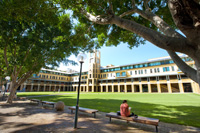Molecular Biology of Nucleic Acids (Advanced) - BABS3621
Faculty: Faculty of Science
School: School of Biotechnology and Biomolecular Science
Course Outline: http://www.babs.unsw.edu.au
Campus: Sydney
Career: Undergraduate
Units of Credit: 6
EFTSL: 0.12500 (more info)
Indicative Contact Hours per Week: 6
Enrolment Requirements:
Prerequisite: BIOC2101, BIOC2201. Restricted to Advanced Science programs (3985, 3990, 3972, 3973, 3986, 3931, 3936)
Excluded: BABS3121
CSS Contribution Charge: 2 (more info)
Tuition Fee: See Tuition Fee Schedule
Further Information: See Class Timetable
View course information for previous years.
Description
his advanced course is designed for and is restricted to students who plan to pursue research careers in molecular biology or related disciplines. The syllabus is an enhanced version of that for BABS3121 and comprises a detailed analysis of: the structure and properties of nucleic acids, the flow of macromolecular information, DNA replication, repair and the molecular biology of cancer induction, the control of gene expression including transcription and translation, protein structure and function, recombinant DNA techniques, in vitro cell systems, the application of molecular biology, and biotechnology, ethics and the law as they relate to the use of these techniques.
Each of these topics will be illustrated by state-of-the art developments in molecular biology techniques in relevant context such as cancer research, cell products and cellular processes. There will be a particular focus on mechanisms for the regulation of gene expression, recognition of DNA by proteins, recent advances in molecular cloning and related technologies, metabolism and directed mutagenesis.
Practical work reinforces the conceptual understanding and provides hands-on experience with contemporary molecular techniques. Literature surveys, presentations and web-based research will support the development of the following skills: communication (including report writing), experimental design, basic recombinant techniques, and manipulation of genes (cloning and expressing genes), data analysis, interpreting and replication and interpretation of research methods, analysis of research literature. Students will also be actively engaged in hypothesis development and testing, designing research methodology, and writing a discussion.









